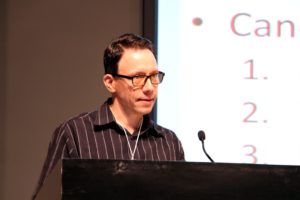If you could learn when you were going to die, would you?
In the Tim Burton film “Big Fish” young Ed Bloom, played by Ewan McGregor, is shown when and how he will die. He proceeds to fearlessly go through life knowing “this is not where it ends.”
It’s an interesting thought exercise: How would knowing the details of your end, affect your present?
It is a squeamishly bleak idea but Steve Horvath, a biostatistician at the University of California, Los Angeles, is trying to figure it out – how to tell how much of a future you actually have.
The Research
Horvath and his colleague Ake T. Lu published their findings in Aging recently and unveiled the project they’ve been hinting at for a few months now – a “time to death” clock called DNAm GrimAge. The two claim it is a tool that can predict when a given person might die. It was announced along with another project, AgeAccelGrim, which gives a countdown to the year you’ll develop cancer or coronary heart disease.

Horvath has been working on his method for a decade now. Central to that method is a process called methylation. Horvath compares it to rust. Over time, certain parts of our DNA become more methylated, or “rusted,” hastening the aging process along with our inevitable death.
In their research, Horvath and Lu took 2,356 DNA samples from the blood of people who had died. They measured the extent of methylation and GrimAge performed the calculations for corresponding death dates. More often than not, these aligned fairly closely with the dates on record.
The only living person to get a GrimAge reading so far is Horvath himself. He didn’t fare well, but it was what he expected.
“I want to say I was four or five years older than expected; I didn’t like that.” But according to GrimAge, he’s on track to die more or less when he expected.
Despite of repeated requests, he does not offer GrimAge readings to anyone else. From a medical perspective, it is effectively useless. Clinicians order tests and develop treatment strategies based on current symptoms. Knowing how many years, or months, a person has left is immaterial to present efforts.
In an article in MIT Technology Review, Horvath states,
At this point, we don’t have any evidence that it’s clinically useful, because there are big error bars.
Practical Use
Horvath’s hope however is that when legitimate anti-aging drugs are developed, GrimAge could be used to test their effectiveness. Armed with functional anti-aging drugs, “doctors could test [your GrimAge number] and say, ‘You know what, you’re aging too quickly. Take this,’” Horvath explains.
But there are other, more immediate and practical uses for Horvath’s invention. The research has already captured the attention of the life insurance industry. After all, a solid death date could mean real savings when it comes to pricing policies.
Some companies are already looking into Horvath’s methylation process as a way to price life insurance policies.
Horvath suggests this could have positive ramifications: A bad candidate for life insurance — say, a diabetic smoker — might have their case bolstered by a better-than-expected GrimAge score. But the reverse, he concedes, is true as well, meaning otherwise healthy-seeming people might find themselves saddled with a worse policy or denied one outright.
Impact on Insurance Rates
Life insurance depends on a person not knowing when they are going to die. If the only people buying life insurance are those who know they will soon die, the industry would have to raise its rates dramatically, or cease to exist.
Mark Kuczewski, director of the Neiswanger Institute for Bioethics at Loyola University Chicago, doesn’t think GrimAge predictions are as straightforward as presented. There are other factors than DNA to be considered. “It’s only going to make a difference in marginal cases,” he said. “Would you use this instead of whether someone’s 100 pounds overweight? Instead of whether someone has a terrible history of genetic illness? Would you use this instead of whether they’re a three-pack-a-day smoker?”
In other words there are other obvious factors than DNA to consider.

Another question is: How would this impact health insurance? Health care is an inherently redistributive system and is able to function that way primarily because we can’t know what will happen to someone. The closer perfect knowledge is developed, the more we have to reckon with the issue of who should pay how much.
Ethics
However GrimAge will be employed in our future will not be up to Horvath. As a researcher at UCLA, he is excluded from the licensing process. His work is the property of the university. More work needs to be done anyway. Horvath quickly admits the results, for now, are “not very accurate.” Results might be off 4-5 years which means GrimAge can only predict the decade in which you’ll die.
The research continues and the results will improve. Companies will have to figure out how best to use the data. We can expect Herculean wrestling over the ethics of a predictive date of death – who should know and how the knowledge should be used.
Who would have thought the day would ever come when you could order a DNA test that would tell you your ancestry, physical attributes, and even which foods you like? But it’s now available through companies like Ancestry.com and 23andMe.com. As these tests become more refined and precise, it is no stretch of the imagination to think one day we’ll be able to also see the date of our death.
So, back to our question: When that day comes, will you?
(shiver)










